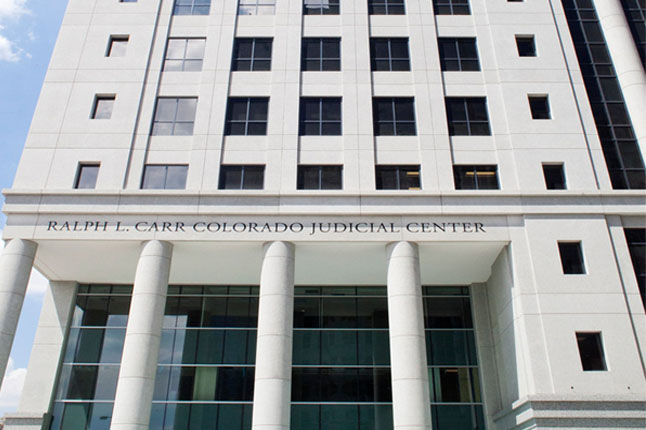

The Colorado Supreme Court announced a new code of conduct for members of the state’s judicial discipline commission, which investigates complaints of judicial impropriety and recommends discipline for judges who have violated professional ethics rules.
The new rules for the Colorado Commission on Judicial Discipline, which were officially adopted Oct. 12, include a requirement for commission members to evaluate the performance of its executive director at least once per year. The CCJD’s current executive director, William Campbell, has held the position since 2009.
The new rules also state that the commission members, staff and executive director must not speak with the public or media on the commission’s behalf about CCJD business except to provide “general information to educate judges, the public, and the news media” about its rules and proceedings. The new rules state that any comments to the public or media must not refer to allegations of misconduct that are pending or may become pending before the commission.
The rule changes require current and former members and staff to secure or destroy confidential documents and protect the confidentiality of CCJD proceedings from disclosure to family, friends and associates.
The Colorado Constitution requires the commission to keep complaints confidential unless and until the commission files recommendations for public sanctions with the Supreme Court. According to data from the Center for Judicial Ethics, Colorado is one of 12 states where disciplinary proceedings are kept secret until a judicial conduct commission recommends public censure. In three other states plus the District of Columbia, the process is even more secretive, with proceedings remaining confidential until a court orders public discipline.
The new rules also include measures to avoid the appearance of impropriety. Members may not represent a judge concerning pending or future disciplinary proceedings, establish or maintain a professional relationship with a complainant or witness in disciplinary proceedings, allow family, business, social or other ties to influence their conduct or use their position on the CCJD to advance their private interests.
Members, staff and the executive director may not contribute to or participate in campaigns for or against a judge’s retention, according to the new rules, and may not take actions in other campaigns that would be construed as the CCJD’s viewpoint on a candidate or referendum.
The revised rules spell out several conditions that could cause a member to be disqualified from CCJD proceedings or deliberations. These include situations where a member is the subject of a complaint or a close personal friend of the subject, has personal knowledge of evidence related to the allegations, expects to be a witness regarding the judge’s conduct, has a personal bias regarding the judge or complainant or has a personal or professional relationship with a complainant or witness.
Finally, the new rules specify procedures for handling complaints regarding the CCJD’s executive director and staff.
Campbell said in an email that the CCJD typically proposes rule changes, which the Supreme Court then reviews, revises and approves. “In this instance, the members of the Commission were following their internal policies regarding recusal from consideration of complaints where they may have had a conflict. We proposed the changes to Rule 3.5 [on the Code of Conduct for Members] to codify our policies,” Campbell said. “The proposal was accompanied by revisions to other rules that we later withdrew. In the meantime, the Court added some revisions. The result was a longer process than usual.”
The CCJD consists of 10 members who serve without compensation. Its members include two county court judges and two district court judges appointed by the chief justice of the Colorado Supreme Court, plus two attorneys and four citizens, who may not be current judges or lawyers, appointed by the governor.
According to the CCJD’s website, the commission’s current chair is attorney Elizabeth Espinosa Krupa. Other members include Eagle County Judge Rachel Olguin-Fresquez, 4th Judicial District Judge David Prince, Jefferson County Judge Sara Garrido, 18th Judicial District Judge Bonnie McLean, attorney Mindy Sooter and citizen members Jim Carpenter, Bruce Casias, Yolanda Lyons and Drucilla Pugh.
The commission, which has generally kept a low profile, found itself in the spotlight earlier this year following a February Denver Post exposé about allegations of sexual harassment within the judicial branch and an alleged seven-figure contract to cover them up. Days after the news broke, the Colorado Supreme Court released a memo detailing several alleged incidents of sexual harassment and judicial misconduct.
On Feb. 12, the CCJD said in a news release that a review of records from the past five years hadn’t yielded any referrals matching the “limited details reported publicly” about the allegations detailed in the memo. “It’s puzzling to us,” Campbell said about the lack of matching complaints in a February interview with Law Week, adding that the judicial branch’s human resources staff “have always been very cooperative” in working with the commission. He noted that some of the alleged misconduct by judges might fall outside of the commission’s jurisdiction, especially complaints dealing with hiring, firing, training and other HR matters.
In an Aug. 20 statement, the CCJD announced it appointed Denver firm Rathod Mohamedbhai to serve as special counsel to assist in information gathering efforts on individual complaints and provide assistance in evaluating and improving the commission’s investigative, information sharing and enforcement processes.
The commission receives an average of 180 complaints each year, but the vast majority of those are tossed out because they target people or actions that fall outside of the commission’s jurisdiction. The commission shares data on the number and type of complaints received in its annual reports, which also include details of public disciplinary action against judges.

